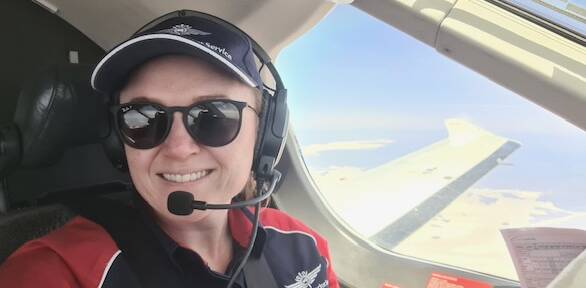
Laura Koerbin is a woman who likes to have a five-year plan, and in 2022 her most recent plan came to fruition when she landed a pilot's job with the Royal Flying Doctor Service (RFDS).
Subscribe now for unlimited access.
or signup to continue reading
The first seeds had been planted while she was building up her flying hours and learning alongside her father Rex Koerbin who owns Merimbula Aircraft Maintenance, at Merimbula Airport on NSW's South Coast.
"I was very lucky to see the medical aircraft coming into Merimbula when I was younger. I remember seeing the flying doctors from Bankstown and every now and then I'd get to talk to them and it looked cool," Laura said.
Flying commercial aircraft never really appealed to her.
"I wanted to give back rather than having the cruisey life and who better than the RFDS."
And so started a series of jobs in aviation, each one with the aim of getting closer to the goal of a pilot's job with the RFDS.
First came scenic and charter flights around Lake Eyre in South Australia and while it was good to build up hours, Laura knew she needed to build up her hours in remote areas, night flying and also fly a turbo prop aircraft.
"It was all about hours, experience and turbo time," Laura said, in order to tick the boxes she had identified for her goal.
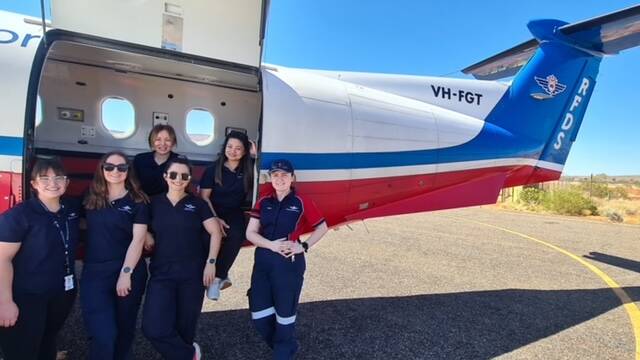
Then in 2018 Laura was awarded a scholarship by the Australian Women's Pilots Association, using it for turbo prop training at Moruya. What followed next was a job with Aviair out of Broome in WA, doing Fly In Fly Out (FIFO), scenic flights and clinics around the Kimberley.
Laura then got her chance to fly a Pilatus PC-12, the Swiss high-performance utility aircraft used by the RFDS. It was a case of the stars aligning to enable Laura to build her confidence and experience in outback flying.
"I was lucky I was able to tick off the boxes and I got called up last year. It's my dream job that I've had my eyes on for a long time."
Laura works from the Port Augusta Base where in addition to outback retrievals and aeromedical transfers, the RFDS delivers 'fly-in' GP health clinics, dental clinics and immunisation clinics in rural and remote communities.
There's a 24 hour roster with a 12 hour on call shift.
Recently Laura flew five days in a row providing the transport for fly in clinics where nurses or doctors fly in to remote areas to hold primary health care clinics.
People in regional areas get upset about the level of primary health care and access to doctors but in remote areas or for those living and working on a station, it's at a whole different level.
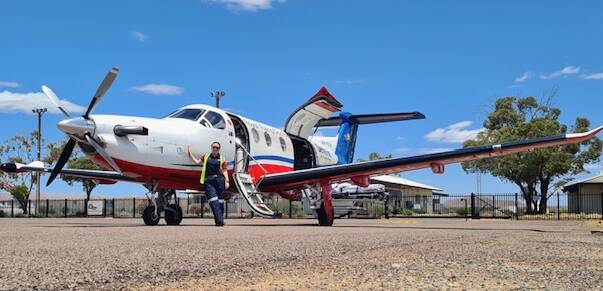
Some locations may have a remote medical chest installed. In the event of a time sensitive emergency or if the RFDS can't take off because of weather issues, the local nurse can be talked through what to do while waiting for the aircraft to arrive, Laura said.
"When we go into Oodnadatta (in outback South Australia) some drive over two hours to see the doctor from the stations. Pregnant mums drive two hours for a check up.
"Last week we did a higher level retrieval and flew out to a station where there had been an accident. We had to transport the patient on the back of a ute to the aircraft and then fly directly to Adelaide to the hospital. It's really dynamic," Laura said.
IN OTHER NEWS:
She recently heard air traffic control hold an international flight so that the aircraft she was flying could land first.
"You've got to be able to land on dirt strips with no wind sock and then get on a Troopie to the homestead but also be confident flying into big city airports."
On a normal run there's a pilot and a nurse but on more critical incidents a doctor as well and two stretchers.
"You're not expected to know how to do the medical stuff but I help with loading and unloading, holding monitors; I like to help wherever I can, like making tea for the nurse," Laura said.
Sometimes the arrival of a male nurse and female pilot can produce some amusing results as on one occasion when a paramedic automatically tried to do a patient hand over to Laura, apologising profusely when he realised his mistake.
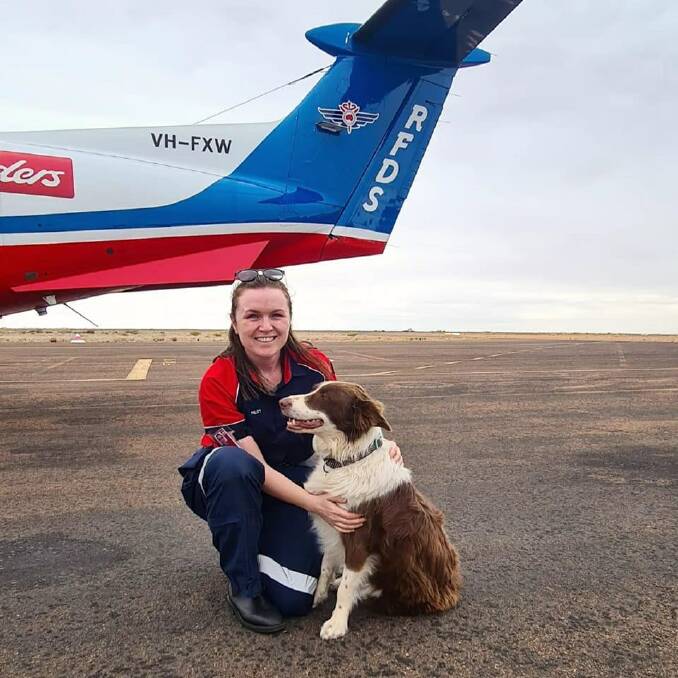
So what's it like working across the outback?
"You always pack lunch, take an overnight bag with a change of clothes and plenty of water," Laura said.
The weather is one issue; both the aircraft and the people inside can be heat affected on really hot days.
"You have to manage the heat challenges and decisions around fuel because there aren't many places. It's always good to have a back up plan and Coober Pedy is a good option," Laura said.
"In winter there can be turbulence from cold fronts and in summer it can be hot and turbulent with storm clouds. You have to work around those.
"You can't get caught up in the pressure of someone needing our help, it's always safety first and there's a doctor on call to talk on the phone and in small towns a clinic. On the stations it can be more time critical," Laura said.
"Some older patients are pilots too and like to ask questions. There's some nice moments like that."
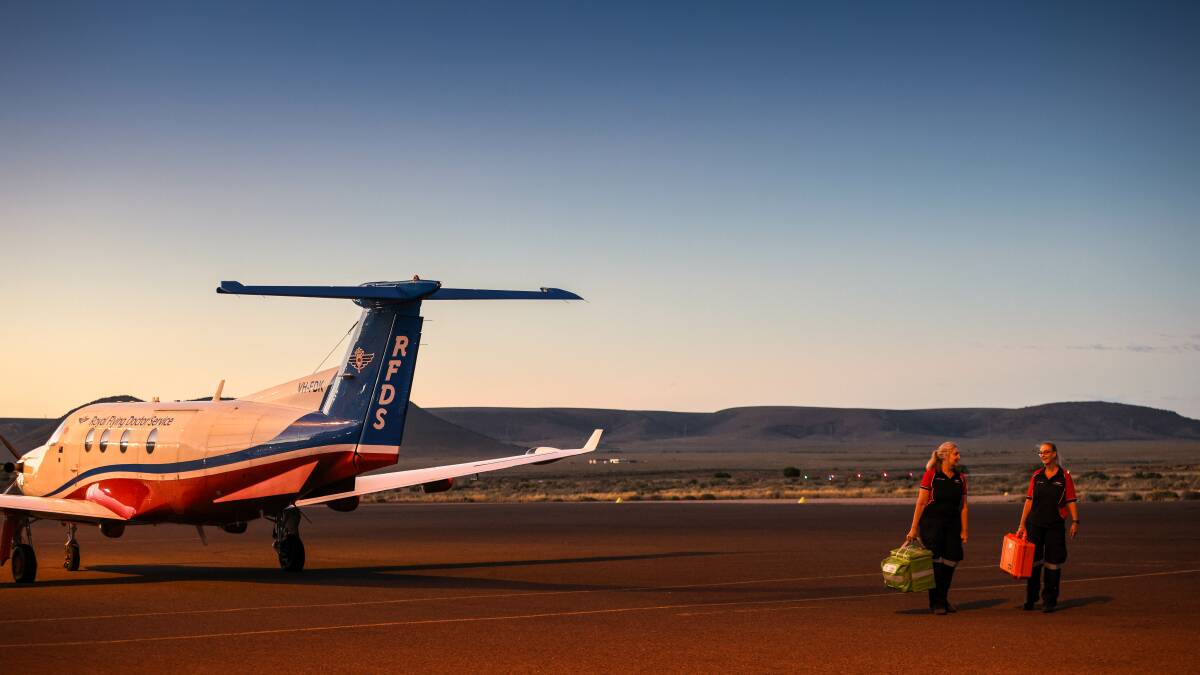
About the RFDS
The RFDS has been saving lives in rural and remote Australia for more than 90 years.
The RFDS is the largest aeromedical organisation in the world; it operates a fleet of 79 aircraft located across 23 aeromedical bases across Australia - 21 aircraft are located in South Australia and the Northern Territory.
Today, the RFDS provides 24/7 emergency aeromedical and primary healthcare services to more than 330,000 Australians every year - that's someone every two minutes - be it an aeromedical evacuation, a GP and Community Health Nurse clinic, a telehealth call, a mental health or oral health clinic, or a child's immunisation.
The RFDS conducts 100 flights across Australia every day. On any given day, the RFDS will airlift 15 South Australians and eight Territorians to safety.
In addition to outback retrievals and aeromedical transfers, the RFDS delivers 'fly-in' GP health clinics, dental clinics and immunisation clinics in rural and remote communities. In SA these clinics are delivered from the RFDS Port Augusta Base.
Across four bases in SA/NT (Adelaide, Port Augusta, Alice Springs, Darwin), RFDS has a team of 46 pilots.
The RFDS relies on bequests, fundraising and donations to replace its 'flying intensive care units' - at a cost of over $10 million each.
About the RFDS Port Augusta Base
The RFDS SA/NT's state-of-the-art operations communications centre is located at Port Augusta Base, from which operations coordinators receive emergency calls, plan and assign all 24-hour emergency retrieval and inter-hospital transfer flights in SA/NT.
The Port Augusta Base is headquarters of the RFDS Primary Health Care Service, which serves an area of 840,000 square kilometres, providing comprehensive primary health care services to residents in the Far West and North West regions of SA. Services include digital health consultations, remote fly-in primary health care clinics offering specialist chronic disease, mental health, oral health, maternal health, breast cancer and community health nurses/clinicians.
In addition to our core of doctors, pilots, flight nurses, engineers and operations coordinators, allied health clinicians are based in Port Augusta.


